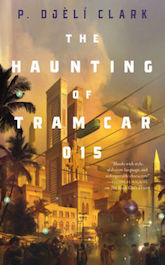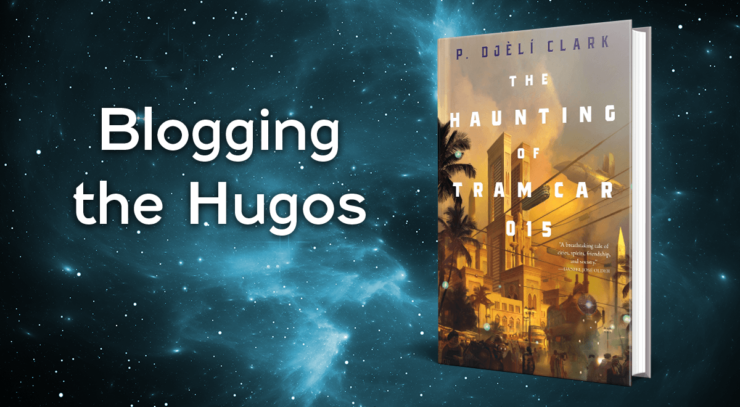In the lead-up to the 2020 Hugo Awards, we’re taking time to appreciate this year’s best novella Finalists, and what makes each of them great.
The Cairo of P. Djèlí Clark’s novella The Haunting of Tram Car 015 is in a state of perpetual, and productive, flux. It is 1912, but in Clark’s world, “it had been some forty years since the wandering Soudanese genius—or madman, take your pick—had, through a mix of alchemy and machines, bored a hole into the Kaf.” The mysterious al-Jahiz—perhaps a time traveler, perhaps a prophet, perhaps a harbinger of doom—disappeared but left a world transformed. Djinn and other once-mythical beings openly walk the land and have contributed to an explosion of technological-magical growth. Egypt has become a great world power, while European colonialists have retreated to their homelands, expelled by magic and forced to reevaluate the “superstitions of the natives and Orientals” they once despised. No religion has sole dominion over magic, so religious tolerance laws have been enacted, though biases remain: Many still distrust the new adherents of the revived old religions. And, spurred in part by the role women played in the great anticolonial struggles, suffragette and feminist movements have begun agitating for equal rights. It’s a multiethnic, multicultural, and generally civil society, but, like all societies, not without its tensions and contradictions.
In the midst of all these changes, Agent Hamed Nasr of the Ministry for Alchemy, Enchantments, and Supernatural Entities has his own concerns. The Ministry has assigned him a new partner, the affable and officious Agent Onsi, and has sent them to solve an unusual problem facing Cairo’s elaborate system of magic-powered suspended tram cars. Something uncanny, perhaps a djinn, has taken up residence in Tram Car 015 and has begun attacking conductors and passengers. The two Ministry agents have training in dealing with the supernatural, but neither suspects just how dangerous this case will prove.
Planting the rookie Agent Onsi with the jaded Hamed gives Clark the opportunity to explain the workings of his alternate Cairo, but both characters prove likable and intrepid. Hamed may disdain Onsi’s penchant for long recitals of abstruse regulation (“Article 273 of the criminal code which forbids trespass and inhabitation of public property owned by the State, Article 275 on acts of terrifying and intimidation of citizens,” etc.), but he’s pleased to discover that the new hire is smarter and more flexible than expected. If the resolution of the case finds Hamed and Onsi in a ridiculous situation, at least they have the satisfaction of being heroically ridiculous.
Buy the Book


The Haunting of Tram Car 015
As much as I liked the central mystery and as much as I enjoyed the two agents and their growing friendship, what impressed me most about The Haunting of Tram Car 015 is Clark’s worldbuilding. The novella format precludes going into great detail, but the hundred-odd pages give a vivid sense of a society undergoing technological (in this case, technological-magical) change and of the social adjustments and upheavals that invariably accompany modernity. Clark is a historian of culture in his day job, and it shows in the best ways. Time and again, I was reminded of Terry Pratchett’s Discworld books, which over decades became the story of a world confronting new tools, new industries, and new ways of life. At present, Clark’s Cairo series consists of just a few stories, but I have no doubts that it could sustain a longer series.
Clark’s Cairo, on the verge of granting women the vote, is changing for the better, but even its best-intentioned men have substantial gaps in their understanding. Without delving too far into spoilers, the central mystery of the tram car haunting relates to women’s agency and men’s fears. Without women’s knowledge, the tram car’s mystery would go unresolved; without their heroism, the final exorcism would end in bloodshed. The Cairene women get the vote at the end of the novella, but Clark makes it clear that such progress is neither easy nor inevitable. Even in a world of djinns and alchemy, protesters still need to take to the streets and demand their rights.
The Haunting of Tram Car 015 is an accomplished story, but not a flawless one. Exposition sometimes feels shoehorned in, and at times the writing falls slightly short of the novella’s conception. I couldn’t help but think that tighter line-editing would have improved an already impressive novella. Still, the occasional clunky sentence (“The atmosphere was nothing less than electric as everyone waited at this historic spot to hear parliament’s decision on granting the greatest right to the majority of Egypt’s populace.”) or piece of gawky exposition seems a small price to pay for the imaginative brio and sociological insight that Clark offers throughout The Haunting of Tram Car 015.
Clark’s forthcoming book, Ring Shout, has an irresistible premise: D.W. Griffith as malign sorcerer and The Birth of a Nation as his evil spell; after reading Haunting, I’m excited to see where Clark goes next. The Haunting of Tram Car 015 is a finalist for Best Novella in the 2020 Hugo Awards, and was also a finalist for the Nebula and Locus Awards; it’s exactly the kind of book I’m glad to read and might have missed without its awards attention. This novella deserves the many nominations it has accrued; it’s been a long time since I’ve seen such a compelling world established in so few pages. I hope that Clark revisits his supernatural Cairo, and that many readers take a trip there.
Matt Keeley reads too much and watches too many movies. You can find him on Twitter at @mattkeeley.










